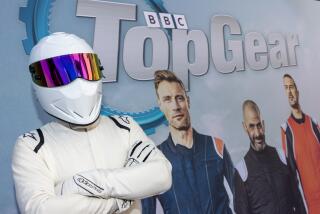‘Top Gear’ shifts gears with a U.S. version
- Share via
“Top Gear,” the hit BBC car show broadcast in 170 countries and watched by 350 million weekly viewers, is a tough act to follow. Now, the fast-paced and intelligently humorous “Top Gear” is jumping the pond in an Americanized version that premieres Sunday on History.
As the American take on the British classic model prepares for its debut, the Web has been abuzz with speculation that the made-in-the-U.S. version would be, at best, a bad imitation of the beloved original, which stars a trio of wizened auto enthusiasts. At worst, some fans of the British show feared, it would be an abomination. Indeed, it wasn’t even clear to many why an American version was necessary, since the British “Top Gear” is already a cult hit in the U.S. on BBC America.
But “there’s a call for more and more ‘Top Gear,’” said John Hesling, senior vice president of programming for BBC Worldwide Productions, which produces the British, Australian, Russian and, now, American versions of the show. “The program has done incredibly well around the world, which is limited by the fact you have three guys who do the mother show back in the U.K. [Jeremy Clarkson, James May and Richard Hammond]. They do 10 or 12 episodes a year. They take a long time to do. They’re all really busy. There’s a clamor for new episodes, and you can’t clone those three.”
Broadening the brand with local versions in other lands that have strong car cultures was the best option, the BBC Worldwide brass decided. The challenge was how best to retain the essence of the original, with its emphasis on cinematography, humor, cars and, of course, the men who could best talk about and flog them.
The key was casting. Over the course of three years in which three networks were involved, hundreds of potential hosts were auditioned, including radio personality Adam Carolla and Pulitzer Prize-winning car critic Dan Neil, to name a few, finally, three Americans — Tanner Foust, Rutledge Wood and Adam Ferrara — were chosen, largely for their good on-screen chemistry.
“In the beginning we were mildly obsessed with trying to re-create the characters of the U.K., with Jeremy Clarkson at the top and the other two doing different things,” Hesling said.
Foust, 37, was first to be selected. A race- and stunt-car driver with pretty-boy good looks and a playboy sense of humor, Foust is the most technically adept driver of the bunch. Then there’s Wood, 30, a bearded and likable “every guy” who cut his automotive teeth reporting NASCAR for the Speed channel and comes across as a kindhearted and happy-go-lucky car enthusiast and sidekick. Adam Ferrara, 44, is the quick-witted stand-up comic and guy’s guy with an appreciation for cars and an X chromosome that makes him game for experimentation.
It wasn’t clear they would be cast as the top three gearheads until the production company dropped them off together in an abandoned parking lot earlier this year with a Mitsubishi Evo 10 and Foust “started driving around like he pulled a bank job,” said Ferrara, who was riding in the car with Wood. “We all just started messing around and laughing. A few English guys were nodding and writing [stuff] down.”
And voilà: “Top Gear” American style was born. Like the British original, the U.S. show takes place, at least in part, on a set in front of a live audience. There is also a “Stig,” a helmeted and unknown track driver who races cars against the clock.
But the real focus of the show is outdoors and cars — luxury cars, fast cars, classics. (They race Lambos, and even get chased by a military helicopter in the first episode.) Whatever car has a story behind it and can be put through its paces in unusual, exciting and dramatic ways.
Will it fly with a U.S. audience?
“Expectations were both high and dismally low and destined for failure from the time we got the cameras out,” Hesling said, “but I hope we have managed to achieve something that was never meant to replace the mother show but is a hearty kind of addition.”
More to Read
The complete guide to home viewing
Get Screen Gab for everything about the TV shows and streaming movies everyone’s talking about.
You may occasionally receive promotional content from the Los Angeles Times.




